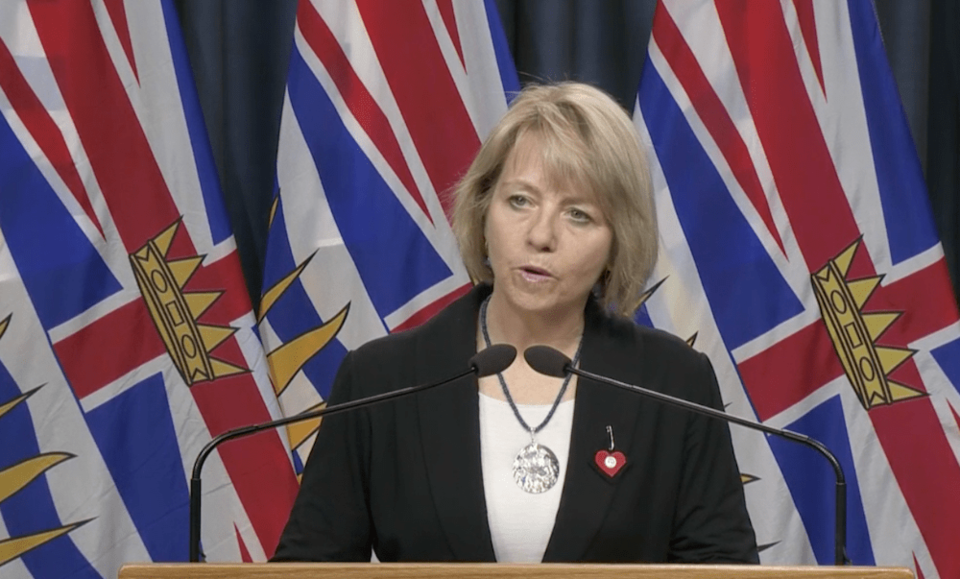There are now 1,724 cases of the coronavirus (COVID-19) in B.C., after health officials announced 25 new cases Tuesday.
Provincial health officer Dr. Bonnie Henry reports that there are 707 cases in Â鶹´«Ã½Ó³»Coastal Health (VCH), 715 in Fraser Health, 109 on Â鶹´«Ã½Ó³»Island, 153 in Interior Health and 40 in Northern Health.
There are no new outbreaks in long-term care facilities. Currently, there are 20 active outbreaks in facilities and one acute care unit in the Â鶹´«Ã½Ó³»Coastal Health and Fraser Health regions, with 319 individual cases are associated with these outbreaks.
The outbreak at the Mission federal correctional institute in the Fraser Valley continues to grow. Now, the institute has 76 people who have tested positive, including 65 inmates and 11 staff.
There has been no additonal transmissions from people who have come back to B.C. from the oilsands Kearl Lake Project in Alberta. Seven previous cases are related, and Henry is still encouraging everyone to self-isolate for 14 days who was at the project. Anyone who was or is symptomatic is asked to call 8-1-1.
There have been one additional deaths, for a total of 87 fatalities in the province.
There are currently 109 people in acute care in hospital, and 51 are in intensive care.
1041 people have fully recovered and are no longer in isolation.
Â鶹´«Ã½Ó³»Coastal Health (VCH) Public Health has declared an outbreak of COVID-19 among staff working at United Poultry Company Ltd., a chicken processing plant located at 534 East Cordova Street. To date, 28 employees of the facility have tested positive for COVID-19. All employees at the facility are being managed as either COVID-19 cases or close contacts and have been told to self-isolate.
VCH reports that it first became aware of a potential outbreak after receiving a positive lab test on Sunday, April 19, from an employee of the plant. In the course of its investigation, a VCH Public Health team attended the processing plant on Monday, April 20 and tested 71 staff who were physically present, resulting in 27 additional positive cases of COVID-19, which brings the total to 28 cases to date. VCH closed the plant the same day.
According to Canadian Food Inspection Agency (CFIA), there is no evidence to suggest that food is a likely source or route of transmission for the virus. At this time, there have been no reported cases of food or food packaging being associated with the transmission of COVID-19. Therefore, no recall of chicken products distributed from this plant is required.
"I do want to say that I know that there will be concerns about the products that have come out of this," says Henry. "We don't have any evidence that COVID-19 can be spread from meat or products like that."
With this in mind, Henry mentions that raw chicken can have other harmful bacteria, such as salmonella.
"It's very important that people maintain the important hygiene practices .. that you are mindful of cross-contamination," Henry remarked regarding the handling of raw chicken. "And making sure poultry is cooked appropriately and making sure you clean surfaces after handling raw poulty."
Yesterday, Henry mentioned the new Rural Remote and Indigenous Port Strategy that is welcomed as a way to recognize and proactively support communities that may have had limited access to the level of healthcare found in larger urban centres. She reports that the program will allow more on-site testing and faster access to primary and urgent care. She adds that it is an important part of reconciliation, because it recognizes that First Nations and Indigenous peoples have not received the support that other parts of society have in B.C. in past pandemics.
Henry also encourages everyone to be kind to people who have to continue to work during the pandemic, such as those working in grocery stores, pharmacies, and in health care. She adds that isolation can be challenging, and that anyone who has an underlying illness should contact a doctor through virtual care. She mentions and as useful resources for mental health.
In a previous briefing, Henry noted that people should consult the new online assessment tool if they aren't sure if they require further testing or assessment for COVID-19. She also underscored the importance of physical distancing, hand washing, covering your mouth if you cough, not touching your face and staying home if you are sick.



